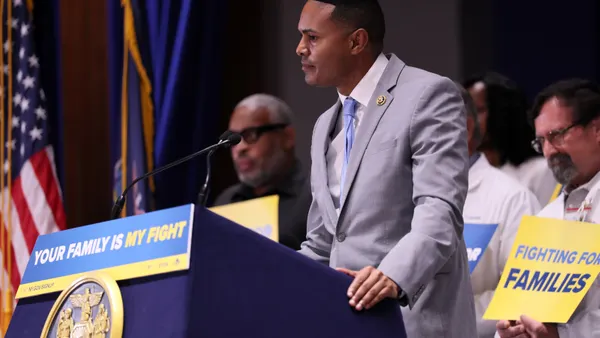Dive Brief:
- The CEOs of credit card companies Visa, Mastercard, American Express, and Discover Financial, as well as industry counterparts FIS, Fiserv and Global Payments, on Tuesday formed a trade association called the Payments Leadership Council (PLC). The companies are locking arms just as reports emerge that some are planning to raise interchange "swipe" fees, perhaps as soon as next month.
- Sen. Dick Durbin (D-Ill.) and Rep. Peter Welch (D-Vt.) on Wednesday in a letter urged Visa CEO Alfred Kelly and Mastercard CEO Michael Miebach not to impose fee hikes, saying it would be a mistake that would hurt struggling small businesses and consumers. The Merchants Payments Coalition, which has often battled the credit card companies over fees, praised the Democrats' letter. Durbin fought debit and credit fees for years, including in the Durbin Amendment to the 2010 Dodd-Frank Wall Street Reform and Consumer Protection Act.
- With Democrats now in control of the White House and Congress, credit and debit card fees could face renewed scrutiny and legislative action. "Fee rates are more than high enough already," Durbin and Welch wrote. Overall processing fees tallied $116.4 billion in 2019, according to the Merchants Payments Coalition.
Dive Insight:
The two sides have done battle before, feuding a decade ago over the Durbin Amendment, which capped debit card fees for big banks. At that time, proponents fell short of imposing similar restrictions on credit card fees, but the Durbin-Welch letter this week demonstrates those fees are still in legislators' sights.
The lawmakers in their Wednesday letter pressed Kelly and Miebach to call off their plans to raise fees during the pandemic, and praised the companies' decision to hold off on such increases last year. "For the sake of consumers and small businesses, we again urge you: don't do it," the March 3 letter said.
The new leadership council in its inaugural move a day earlier encouraged congressional leaders to pass coronavirus relief to "further aid recovery efforts." The House passed a $1.9 trillion stimulus package last month and the Senate is weighing a companion measure. The council also took the opportunity in its March 2 letter to give its members credit for enabling electronic payment systems that helped businesses and consumers adapt to the pandemic. There was no discussion of increasing swipe fees next month.
The council appointed Raj Date as its founding director. He was the first deputy director of the Consumer Financial Protection Bureau (CFPB) during the Obama Administration. Date declined to spell out the council's other policy objectives to Payments Dive in an interview, and wouldn't comment directly on the Durbin-Welch letter's plea.
A Visa spokesman also declined to comment on the Durbin-Welch letter, and told Payments Dive: "We are adjusting our interchange rates next month and it's the first major restructuring in about ten years."
In a Mastercard statement, the company didn't comment directly on the expected fee increase or the Durbin-Welch letter, saying in part: "In 2020, we announced plans to make some adjustments to interchange rates for the first time in ten years. The changes include both increases, as well as decreases across all small ticket transactions, and decreases in categories like car rental, lodging, certain restaurants and daycare. These changes were planned before the pandemic and have been delayed for a year."
Wading into the fray, the Merchants Payments Coalition, which represents retailers bearing the fees and passing them to consumers, lauded the Durbin-Welch letter, predicting a fee increase would mean $1.2 billion in additional fees for their members. That coalition contended the fees collectively have more than doubled over the past decade.
The merchants' group supported the Durbin Amendment a decade ago, fighting against the credit card company contingent. That law capped debit card fees imposed by banks with more than $10 billion in assets. Another credit card industry interest group, the Electronic Payments Coalition, was still arguing last year for the repeal of the Durbin Amendment, and worrying over the threat of further curbs.
With Durbin now serving as majority whip in the Senate and President Biden focused on providing relief for households, the payments industry may indeed have more to fear. Industry interests on either side of the debate appear to be readying for a new round of clashes over fees.










